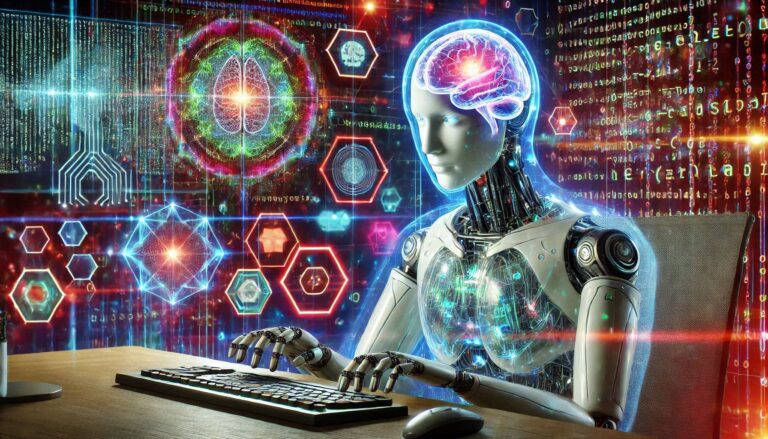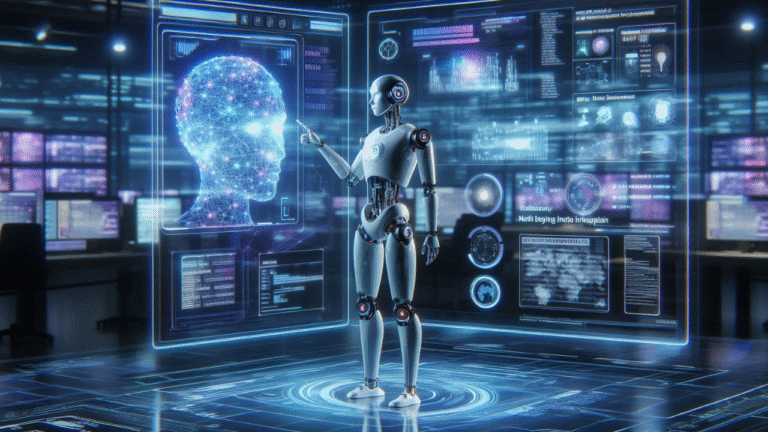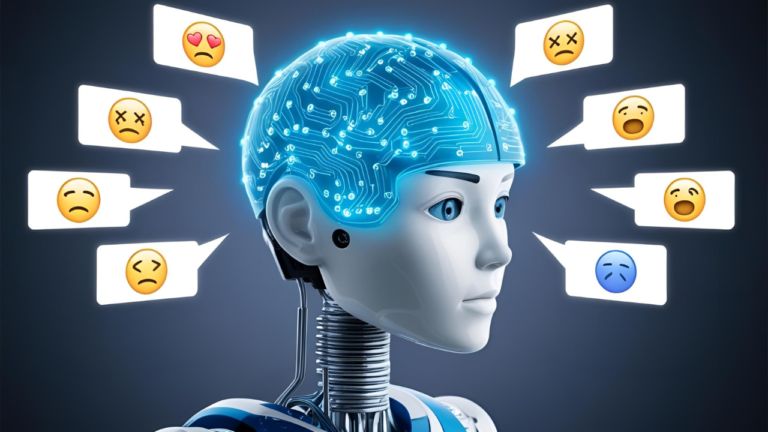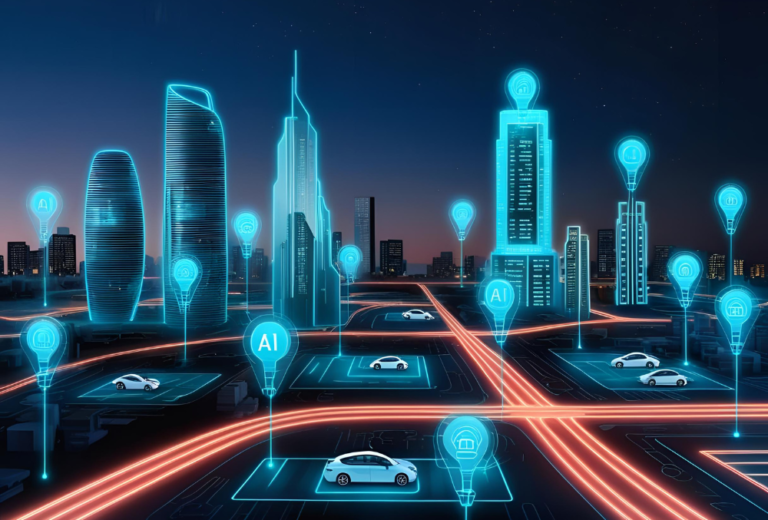🧠 Introduction: The AI Paradox
Have you ever found yourself opening the calculator app for the simplest math? Or pulling up Google Maps to navigate a neighborhood you’ve driven through a hundred times? Maybe you’ve even let an AI tool write an email you could’ve easily typed yourself.
It’s convenient—no doubt. But these everyday shortcuts reveal a growing question many experts and educators are starting to ask: is AI making us dumber?
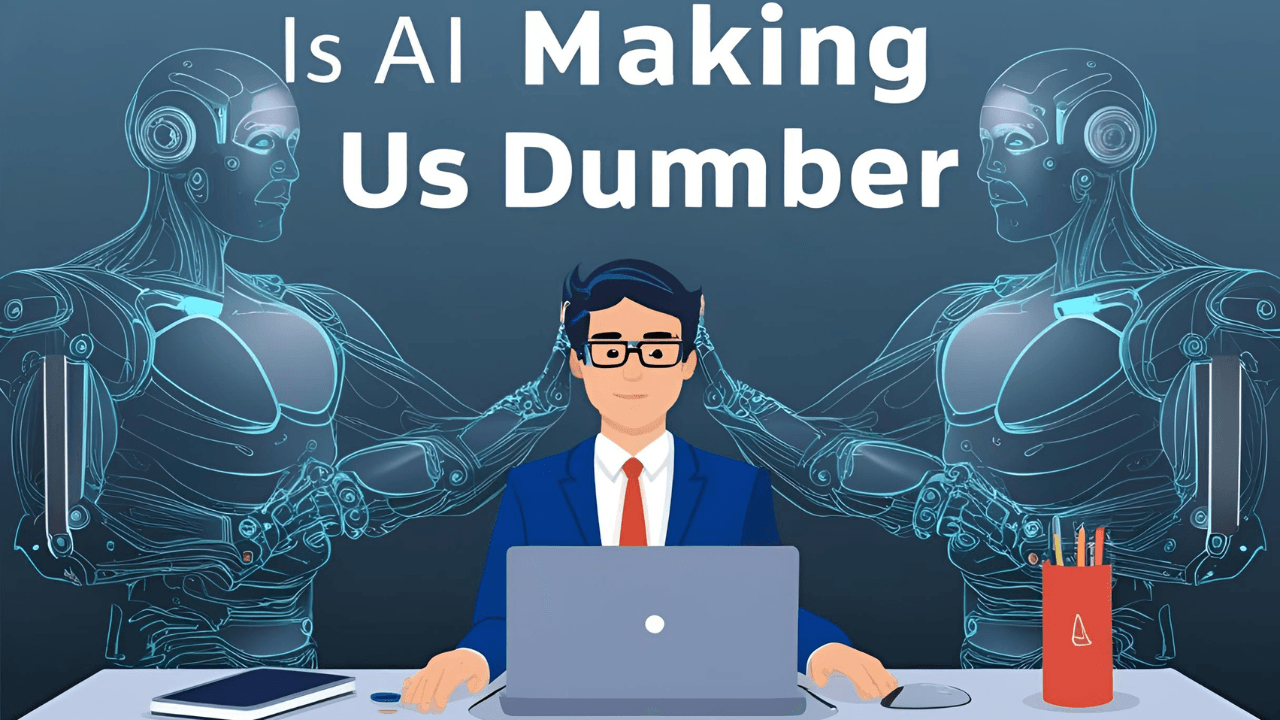
As artificial intelligence becomes more integrated into our daily routines—helping us write, search, navigate, learn, and even think—it’s clear that the cognitive load we once carried ourselves is being handed over to machines. Tasks that once demanded memory, critical thinking, or problem-solving are now effortlessly completed with a voice command or a single click.
This shift from human effort to machine assistance is more than just a convenience; it may be fundamentally changing the way our brains operate. Some researchers warn that the constant outsourcing of thought to algorithms might erode our natural mental faculties over time. We’re no longer required to remember facts, calculate figures, or even finish our own sentences—AI handles that for us.
So again, we return to the unsettling question: is AI making us dumber, or are we simply evolving into a new type of intelligence—one that’s deeply dependent on the tools we’ve created? This article dives deep into the psychology, science, and social implications of AI dependency—and what it could mean for the future of our minds.
🧩 How Is AI Making Us Dumber?
When we ask, how is AI making us dumber, we’re not questioning human intelligence itself—we’re questioning how our overreliance on artificial intelligence and digital tools may be weakening critical cognitive functions like memory, problem-solving, and independent thinking.
🧠 What Does “Dumber” Really Mean?
“Dumber” in this context doesn’t mean less intelligent—it means less mentally active. The impact is showing up in three areas:
- Memory: We remember less because we rely on machines to remember for us.
- Problem-solving: We skip deep thinking, favoring instant AI-generated answers.
- Creativity: We generate fewer original ideas when artificial intelligence offers ready-made content.
This isn’t just casual observation—it’s rooted in cognitive science.
📱 Cognitive Offloading: Are We Outsourcing Our Brains?
This growing dependency is known as cognitive offloading—the act of transferring mental processes to tools like smartphones, AI chatbots, calculators, or GPS. While convenient, this shift may be making us mentally lazier.
A study published in Computers in Human Behavior found that individuals who frequently use smartphones tend to rely more on intuitive thinking than analytical reasoning—suggesting that technology may reduce our mental effort over time.

🧠 Memory Loss: The Google Effect
Our dependence on AI search engines has led to what scientists call “digital amnesia.” A landmark study from Columbia University demonstrated that people are significantly less likely to remember information if they know they can find it later online. This is called the Google Effect (Sparrow et al., 2011).
So when we reflexively Google something instead of thinking through it, we’re effectively weakening our natural memory retention.
🧮 Calculators & Google Search: Instant, But Inhibiting
- Calculators, once used for complex problems, are now often used for even simple arithmetic. This overuse correlates with declining mental math and logical reasoning, as noted by the National Council of Teachers of Mathematics.
- Google Search, while incredibly powerful, fosters shallow processing. Instead of analyzing, we skim, click, and forget. This erodes comprehension and retention—the mental work behind real understanding.
🧭 GPS: Mapping the Route, Not the Brain
Using GPS too often may affect our spatial intelligence. According to a study in Nature Communications, when we rely on GPS navigation, brain regions like the hippocampus—critical for spatial memory—show significantly reduced activity. In short: the more we follow digital directions, the less we build mental maps.
🔤 Autocorrect: Convenience with a Cognitive Price
Autocorrect and predictive typing are great for speed, but at a cost. A 2018 study in the Journal of Language Teaching and Research found that frequent reliance on autocorrect impairs spelling accuracy, particularly in younger users still developing writing skills.
Instead of learning from errors, we increasingly defer to the machine to fix our mistakes—passively accepting rather than actively engaging with language.
📊 AI Overreliance Effects: The Mental Skills We’re Outsourcing
If we lay it all out, the trend becomes clear:
| AI Tool | Replaced Skill | Effect on Cognition |
|---|---|---|
| Calculator | Mental arithmetic | Decreased problem-solving ability |
| Recall and synthesis | Lower long-term memory retention | |
| GPS | Spatial awareness | Reduced hippocampal brain activity |
| Autocorrect | Grammar and spelling | Poorer writing and language mastery |
| AI Writers | Idea generation & structure | Diminished originality and effort |
⚠️ So, How Is AI Making Us Dumber?
By allowing artificial intelligence to replace instead of assist, we’re turning off the mental processes that define us as humans—thinking, remembering, creating. It’s not about abandoning artificial intelligence. It’s about making sure we don’t abandon our own brains in the process.
The Effects of AI Overreliance Effects
As artificial intelligence (AI) becomes increasingly integrated into various sectors, its overuse can lead to significant consequences. Excessive reliance on AI tools may result in AI overreliance effects such as diagnostic complacency in healthcare, diminished originality in creative tasks, and adverse psychological impacts.
Medical AI Tools: A Double-Edged Sword
AI-powered diagnostic tools have revolutionized healthcare by enhancing accuracy and efficiency. However, AI overreliance effects can lead to automation bias, where clinicians may accept AI recommendations without sufficient critical evaluation. This complacency can result in missed diagnoses or incorrect treatments.
For instance, a study published in Radiology found that different types of AI explanations influenced physicians’ trust and diagnostic performance, highlighting the complexities of integrating artificial intelligence into medical decision-making. Moreover, research from Stanford University indicates that humans often accept an AI system’s recommended decision even when it is wrong—a phenomenon known as AI overreliance effects. This overreliance can lead to erroneous decisions in critical contexts such as medical diagnosis.
AI Writing Tools: Erosion of Creativity
In the realm of content creation, AI writing assistants have become commonplace. While they can expedite the writing process, excessive dependence on these tools can erode originality and critical thinking. Research indicates that while AI appeared to help less naturally creative people write more original short stories, it dampened the creativity of the group as a whole.
Experts warn that relying on AI tools for creative tasks can result in the skills people build up beginning to decline, as their minds do not need to be as actively engaged in the task. This AI overreliance effect can lead to outputs becoming less creative, innovative, or of lower quality than they could be. It also prevents individuals from truly exercising their creative problem-solving skills, resulting in a cycle of dependency on AI tools.
Psychological Impact: Diminished Mental Endurance
The pervasive use of AI can also have psychological repercussions. Constant interaction with AI systems may reduce individuals’ mental endurance and problem-solving abilities. A study by NSoft and Dr. Sham Singh, a leading psychiatrist, revealed that 58.1% of users reported increased dependence on AI tools for decision-making.
According to Dr. Singh, although AI helps ease mental strain by managing repetitive or intricate tasks, it also encourages “cognitive offloading”—a tendency where individuals rely on machines for thinking, memory, and innovation, rather than engaging their own mental faculties. This cognitive offloading is a key factor in the AI overreliance effects observed in individuals who increasingly rely on AI systems for everyday tasks. Additionally, a study published in MDPI found a correlation between AI overreliance effects and the decline of critical thinking skills, further emphasizing the negative psychological impacts of excessive AI usage.
Does AI Make Us Lazy?
Artificial Intelligence (AI) has undeniably transformed various aspects of our lives, offering convenience and efficiency. However, this technological advancement may also be fostering a form of behavioral laziness. The allure of instant solutions provided by AI can reduce our patience and motivation for deep thinking, leading to a decline in cognitive engagement and self-reliance.(AI Pacesetters).
Instant Solutions and Reduced Patience
AI’s ability to provide immediate answers and automate tasks has led to a culture of instant gratification. This shift has diminished our tolerance for delayed rewards and our capacity to engage in prolonged, effortful thinking. A study published in Cognitive Science in 2023 found that frequent exposure to AI-assisted decision-making reduced participants’ tendency to question assumptions or generate alternative solutions. This effect was most pronounced in creative problem-solving tasks, where AI-reliant users showed less originality than those working independently. BiologyInsights
Examples of AI-Induced Laziness
Using ChatGPT Instead of Brainstorming
While ChatGPT can assist in generating ideas, over-reliance on it may hinder the development of critical thinking and problem-solving skills. A study highlighted by Psychology Today revealed that while ChatGPT 4.0 enhanced task outcomes, it may have also eroded the critical thinking and reflective processes essential for lifelong learning. Psychology Today
Relying on AI-Powered Summaries Instead of Reading Full Texts
AI-powered summarization tools offer concise versions of lengthy texts, saving time but potentially sacrificing depth of understanding. This practice can lead to surface-level comprehension and a lack of engagement with complex ideas, diminishing our ability to think critically and analyze information thoroughly.
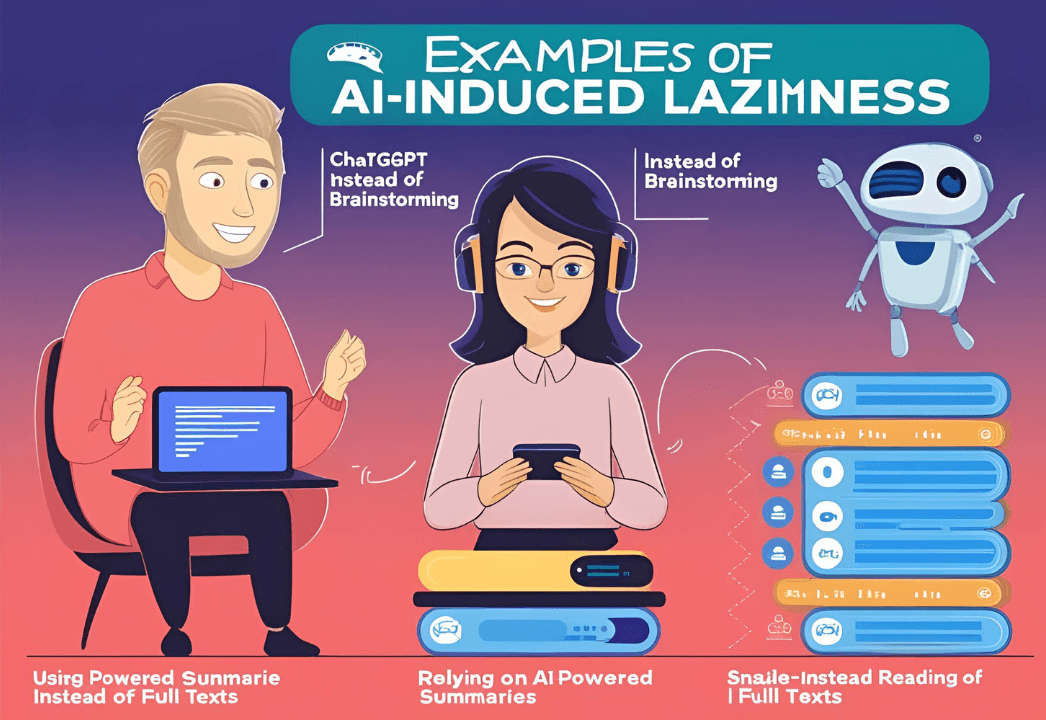
Voice Assistants Replacing Memorization
Voice assistants like Siri and Alexa can answer questions and perform tasks on command, reducing the need for individuals to memorize information or develop problem-solving strategies. This convenience may discourage active learning and cognitive effort, contributing to a decline in memory retention and intellectual engagement.
Psychological Implications
The pervasive use of AI can lead to metacognitive laziness, where individuals offload cognitive tasks to machines, diminishing their ability to monitor and regulate their own thinking processes. Stanford University research describes metacognitive laziness as a tendency among learners to lean heavily on AI tools, which reduces their active involvement in planning, monitoring, and evaluating their own learning—ultimately weakening their ability to connect these mental strategies to educational tasks.
Furthermore, the convenience provided by AI can inadvertently lead to laziness, as basic responsibilities are delegated, critical thinking is diminished, and productivity declines. Striking a balance between leveraging AI’s advantages while preserving motivation, critical thinking skills, and productivity is essential for personal growth, innovation, and maintaining a healthy work-life balance.
Generative AI and Misinformation
Generative AI refers to artificial intelligence systems capable of creating original content—such as text, images, audio, and video—in response to user prompts. These models, including ChatGPT, DALL·E, and Runway Gen-2, utilize deep learning techniques to simulate human creativity and expression.
How Generative AI Produces Confident but Incorrect Responses
Despite their capabilities, generative AI models can produce content that is confidently stated yet factually incorrect. This phenomenon arises because AI systems are trained on vast datasets and generate responses based on patterns rather than verified facts. As a result, AI systems can generate content that appears credible on the surface but is actually factually incorrect.
Risks Associated with Generative AI and Misinformation
- Spread of Fake News and Deepfakes: Generative AI can be exploited to create realistic fake news articles and deepfake videos, which can mislead the public and influence opinions. For instance, AI-generated videos of public figures can be manipulated to spread disinformation .Cambridge University Press & Assessment
- Cognitive Ease Leading to Acceptance: The fluency with which AI generates content can lead individuals to accept it as truthful without critical evaluation. This cognitive ease makes it challenging to distinguish between genuine and fabricated information.
Example: The ChatGPT Hoax about Biden Pardoning Bush
A notable example of AI-generated misinformation involved a hoax claiming that President Biden had pardoned former President George H.W. Bush. This false information was propagated by AI chatbots and viral posts, leading to widespread confusion. Fact-checking organizations debunked the claim, confirming that no such pardon occurred.
Counterpoint: Is AI Making Us Smarter Instead?
While concerns about AI’s role in spreading misinformation are valid, it’s essential to recognize the positive impacts AI can have on human intelligence and capabilities.
Benefits of AI
- Personalized Learning: AI-powered platforms can tailor educational content to individual learning styles and paces, enhancing comprehension and retention. Tools like Duolingo and Khan Academy utilize AI to provide customized learning experiences .
- Creative Expansion through Co-Pilot Tools: AI assists in the creative process by offering suggestions and generating content, allowing creators to explore new ideas and enhance their work. Applications like Adobe Firefly and Figma integrate AI to aid designers and artists.
- Speed and Accessibility: AI accelerates tasks such as data analysis, content generation, and customer service, making information and services more accessible to a broader audience. For example, AI chatbots provide instant responses to queries, improving efficiency.
Reframing the Narrative
AI itself is not inherently detrimental; rather, its impact depends on how it is utilized. When employed responsibly, AI can augment human intelligence, streamline processes, and foster innovation. The key lies in integrating AI thoughtfully into various domains to complement and enhance human capabilities.
The Middle Path: How to Use AI Without Losing Intelligence
While AI can be an incredible productivity booster and creative partner, excessive reliance can lead to cognitive offloading—a phenomenon where people shift their mental effort to external tools, leading to diminished brain function over time. Finding a middle ground is essential to benefit from AI while preserving our mental sharpness.
🔹 Use AI for Support, Not Shortcuts
AI is best used as a collaborator that supports human thought, rather than a substitute for it. According to a study published in Nature (2023), individuals who frequently used AI tools for problem-solving showed lower engagement in reflective thinking tasks.
Example: Instead of letting ChatGPT write an entire article for you, use it to generate structure or explore alternative viewpoints—then write in your own words. This maintains cognitive engagement while boosting creativity.
🧠 Tip: Ask yourself, “What would I write if AI didn’t exist?” before using it.
🔹 Practice Memory Recall in Daily Life
AI tools like Google, Siri, and Alexa provide instant answers, but this ease comes at a cost. According to Dr. Betsy Sparrow’s research on “The Google Effect” (Columbia University), people are less likely to retain information they know they can easily look up.
Practice Tip: Memorize phone numbers, recall grocery lists without notes, or try daily memory exercises. This helps reinforce the hippocampus—the part of the brain responsible for memory formation and recall.
🔹 Turn Off GPS – Relearn Spatial Intelligence
Using GPS constantly reduces spatial reasoning and navigation skills. A study from University College London (2017) found that individuals navigating manually showed increased activity in the hippocampus, whereas GPS users did not.
Challenge: Navigate familiar routes without GPS, or plan part of your journey using landmarks. It reactivates your brain’s natural mapping system.
🔹 Fact-Check AI Output Before Trusting
Generative AI models are probabilistic, not factual databases. They often produce content that sounds right but may not be accurate. Over-trusting AI can lead to the spread of misinformation, especially when users assume outputs are vetted truths.
Example: If AI says “Albert Einstein invented the light bulb,” don’t take it at face value. Verify it from trusted sources (hint: it was actually Thomas Edison).
✅ Tip: Treat AI output as a draft or suggestion, not a conclusion.
🧭 Striking the Balance
By combining the convenience of artificial intelligence with deliberate cognitive practices, users can develop what psychologists call “digital resilience”—the ability to thrive in a tech-driven world without becoming mentally dependent.
Conclusion: The Choice Is Ours
Throughout this exploration, we’ve tackled the central question: Is AI making us dumber? From the classroom to the workplace, from daily habits to deeper thought processes, we’ve examined the subtle yet growing impact of artificial intelligence on our cognitive health.
The reality is, the problem isn’t AI itself—it’s how we engage with it. How is AI making us dumber? It’s not by force, but by invitation—when we lean too heavily on it for decisions, memory, or creativity. These patterns lead to significant AI overreliance effects, such as automation bias, reduced problem-solving, and a weakened ability to think critically on our own.
Yes, does AI make us lazy? In many cases, it does—by offering instant solutions that short-circuit our natural motivation for deep thinking, reading, or recalling facts. It’s no longer uncommon to outsource even basic tasks to voice assistants or let chatbots do the brainstorming for us.
And perhaps even more concerning is the rise of Generative AI and misinformation—where AI tools confidently produce convincing but false content, deepfakes, and misleading headlines. This blurs the line between fact and fiction, especially for users who trust AI blindly.
Think of the dystopian worlds depicted in shows like Black Mirror, where overdependence on AI and technology leads to emotional, psychological, and societal breakdowns. Episodes like Nosedive and Be Right Back present a chilling view of how AI and digital connections, when taken too far, compromise human relationships, critical thinking, and authenticity. It’s not just science fiction—it’s a cautionary tale for how we use (or abuse) technology.
🔍 What We’ve Learned:
- ✅ AI can dull our cognitive skills when used passively.
- ✅ It can misinform when we stop verifying.
- ✅ But it can also enrich our learning, accelerate innovation, and expand creativity—if used mindfully.
The deeper truth? It’s not about machines taking over human intelligence. It’s about whether we’re willing to preserve and sharpen our own.
In every click, prompt, and shortcut—are we choosing convenience over consciousness?
The future of our minds doesn’t lie in AI’s evolution. It lies in how intentionally we choose to evolve alongside it.
Keep Exploring the AI Revolution
Curious about how AI is shaping more than just our minds? Dive into these powerful reads next:
-
🚀 Exploring the Impact of Generative AI in Creative Industries
Discover how AI is reshaping creativity across film, design, music, and more. -
⚡ AI Power Consumption Exploding
As AI grows smarter, it’s also growing hungrier. What’s the cost to our planet? -
🧠 AI and Human Thinking
A deep look at how AI is influencing—not just mimicking—our cognitive processes. -
🕶️ Dystopian Technology: How Science Fiction Became Reality
From Orwellian surveillance to AI-run courts—what sci-fi predicted is already here. -
🌍 Harnessing AI in Predicting Natural Disasters
See how machine learning is saving lives by forecasting the unthinkable.


